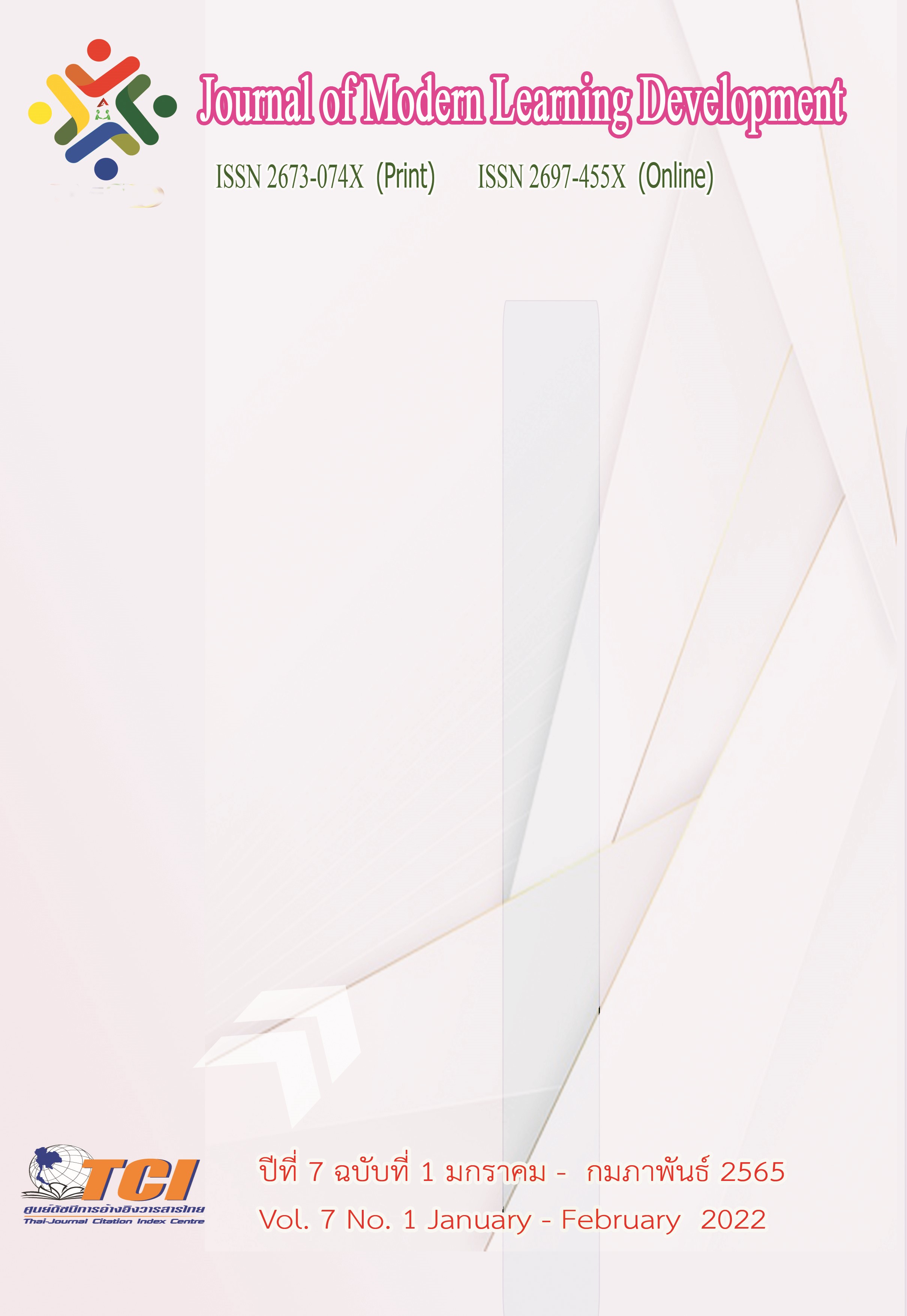The Development of Safe Agriculture of Ban Na Fai Organic Vegetable Growing Group Muang District, Chaiyaphum Province
Main Article Content
Abstract
This research aims to 1) study knowledge, understanding and production characteristics of farmers in the organic vegetable growing group at Ban Na-Fai, Muang District, Chaiyaphum Province 2) Produce food crops for farmers in the organic vegetable growing group 3) Educating the production process of farmers in the organic vegetable growing group to enter the safe agricultural standard 4) Develop a network farmers growing organic vegetables at Ban Na Fai. The sample group was 30 farmers in the organic vegetable growing group at Ban Na Fai, Muang District, Chaiyaphum Province, which was obtained by using a specific purposive sampling method from farmers growing organic vegetables. Ban Na Weir voluntarily joined the project The research instruments were 1) workshops 2) Training material on the provision of knowledge on the production process, in order to enter the safe agricultural standard; and 3) the Farmers Satisfaction Evaluation Form towards the farmers' production process in Ban Na-Fai. The data was analyzed by analyzing the mean and standard deviation of the score using basic statistics (mean, standard deviation), data obtained from in-depth interviews and group discussions (Focus Group). By analysing the content (content analysis) and the satisfaction of farmers with training, the data are analysed using basic statistics.
The results of the research were as follows:
1. Most of the farmers have a good understanding of Vegetable production is safe, that is, safe vegetables are vegetables that use fertilizers and chemicals that do not exceed the standard as prescribed by the Ministry of Public Health.. The top 5 vegetables that are popular to grow, collect and sell to the companies that buy it are morning glory, basil, horseradish, and lemongrass.
2. Guidelines to promote the reduction or termination of the use of chemicals in food crop production for farmers in the organic vegetable growing group, Ban Na Fai, Muang District, Chaiyaphum Province. It can be used as a guideline to promote the reduction or abolition of the use of chemicals in food crop production for farmers in the organic vegetable growing group, Ban Na Weir, Muang District, Chaiyaphum Province, in 4 main ways: 1) Develop and expand the network in the circle. 2) To develop network productivity. Both on an individual level 3) develop cooperation with external organisations and 4) promote and sensitize young people.
3. overall satisfaction and benefit issues Farmers growing organic vegetables at Ban Na Fai, Muang District, Chaiyaphum Province There is a high level of opinion.
4. A guideline for driving the production of safe agriculture of the network of farmers, 1) Request cooperation within the village Communicate information at the community level. Adding network members Establishing a group and developing concrete Production system development And youth participation. 2) The issues of partition were seeds and molasses. Leavening experience Composting experience, and 3) seek cooperation, overseeing the contributions of public sector mentors to guide them through the work.
Article Details
References
กรณัฐ ปิ่นฉ่ำ, มนฤตย์พล อุรบุญนวลชาติ และ สุพัตรา จุณณะปิยะ (2558). การพัฒนาตลาดเกษตรแบบยั่งยืน : ศึกษาการมีส่วนร่วมของเกษตรกรผู้ผลิตผกัปลอดภยัจากสารพิษโครงการอาหารปลอดภัยตลาดกลางผักและผลไม้จังหวัดราชบุรี. วารสารสหวิทยาการวิจัย : ฉบับบัณฑิตศึกษา. 4 (2), 122-132.
ดุษฎี พรหมทัต. (2554). รายงานการวิจัยเรื่องความตระหนักของเกษตรกรในการใช้สารเคมีในจังหวัดพระนครศรีอยุธยา. พระนครศรีอยุธยา: มหาวิทยาลัยเทคโนโลยีราชมงคลสุวรรณภูมิ.
เบญจมาศ จันทร์แก้ว. (2551). รายงานการวิจัยเรื่องการวิเคราะห์ทางเศรษฐกิจของการผลิตผักโดยการใช้สารธรรมชาติและสารเคมี. กรุงเทพมหานคร: มหาวิทยาลัยเกษตรศาสตร์.
วราภรณ์ ปัญญาวดี. (2551). การขับเคลื่อนสู่วิถีเกษตรปลอดภัยจากสารพิษ กรณีการปลูกพืชผัก. วารสาร เศรษฐศาสตร์ ธรรมศาสตร์. 26 (1), 107–127.
อัญชนา ณ ระนอง (2558). การเกษตรที่ลดการพึ่งพิงสารเคมี: กรณีศึกษา กลุ่มเกษตรกรบางกลุ่มในจังหวัดจันทบุรีและปทุมธานี.วารสารการจัดการภาครัฐและภาคเอกชน. คณะรัฐประศาสนศาสตร์ สถาบันบัณฑิตพัฒนบริหารศาสตร์.
Geels,F.W.2002. Technological Transitions as Evolutionary Reconfiguration Processes: A Multi-level Perspective and A Case-study. Research Policy 32,1257–1274
Gonsalves, J., T. Becker, A. Braun, D. Campilan, H. De Chavez, E. Fajber, M. Kapiriri, J. Rivaca-Caminade and R. Vernooy (eds). (2005). Participatory Research and Development for Sustainable Agriculture and Natural Resource Management. A Sourcebook Volume 1: Understanding Participatory Research and Development. International Potato Center-Users’ Perspectives with Agricultural Research and Development, Laguna, Philippines and International Development Research Center, Ottawa, Canada.
Sayers, R.(2006). Principles of Awareness Raising: Information literacy, a case study. UNESCO Bangkok, 124 pp.


